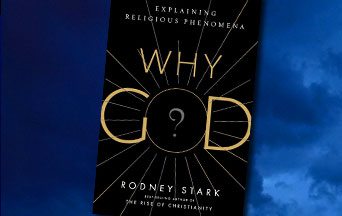
A Review of the Book Why God?: Explaining Religious Phenomena by Rodney Stark (West Conshohocken, Penn.: Templeton Press, 2017).
Having read, reviewed, and enjoyed Dr. Rodney Stark’s 2016 book, Bearing False Witness, it was a delight to be asked to review Why God?: Explaining Religious Phenomena. For those unfamiliar with his works, Stark has made something of a specialty of using his extensive sociological background and considerable historical skills to defend the value of orthodox Christianity.
The title, and much of the introduction, leads one to think that Stark is going to explain why a traditional concept of God is necessary. On the very first page, he states, “all religions assert the existence of a god or gods and that belief in such beings is fundamental to all religious phenomena.” A couple of pages later, we read, “belief in the existence of god or gods has prevailed in every known society from earliest times” and “all attempts to sustain godless religions are a resounding failure.”
 Learn All About the Prophecies of Our Lady of Good Success About Our Times
Learn All About the Prophecies of Our Lady of Good Success About Our Times
I suppose that most people who take their Christianity seriously have been in a conversation with someone who says, “I am spiritual, but not religious.” These folks believe that there are forces out there somewhere, they just resist the idea that there is a specific being called God who can tell them how to live their lives. Given the introduction, I had real hope that Dr. Stark was going to provide an academically defensible formula that I could use to show these wishful thinkers the reasons that they were building the foundations of their lives on beds of sand.
However, much of Why God reads like an undergraduate text on the sociology of religion. As such, it has value–maybe even great value. I could have used it back when I, as a confused undergraduate, took such a course. Dr. Stark very nicely lays out the 87 definitions and 192 propositions that underlay his analysis. In an intellectual climate in which terms are “deconstructed” to the point of absurdity, this sort of clarity is valuable.
Setting aside the indifferentism that is typical of sociology, most of the chapters in the book do answer the questions that a budding sociologist would have about religious observance–what is faith, why do some embrace faith, and the like. This information is hardly earthshaking, but it is well and understandably expressed in such a way as to appeal to the intelligent beginner.
Chapters six and seven take a far more historical bend. Here the tone differs from that of the rest of the book. “Theologies of Doubt and Disbelief” briefly discusses the development of “Liberal Christianity.” Stark moves from the Quakers and the Unitarians through to Paul Tillich and the development of the National Council of Churches. Later there is a very useful section which traces European hostility to Christianity from the French revolutionaries through to the Russian and Chinese communists.
Setting the Record Straight About Catholic History
By chapter eight, Stark puts his sociologist cap back on. Here he discusses the role of the community in the transformation of religious sentiment to religious action. Basically, the point is that a religious person’s actions are indistinguishable from those of the non-religious unless their community supports religious practice. Here Stark takes his fellow sociologists to task, asserting that they are so focused on the individual that they miss the importance of the community.
So, there is much of value in this book. However, Dr. Stark never quite fulfills the promise of the title. In Bearing False Witness, he gives us very practical arguments. I kept hoping that he would do the same thing in Why God. This expectation was not quite fulfilled.

